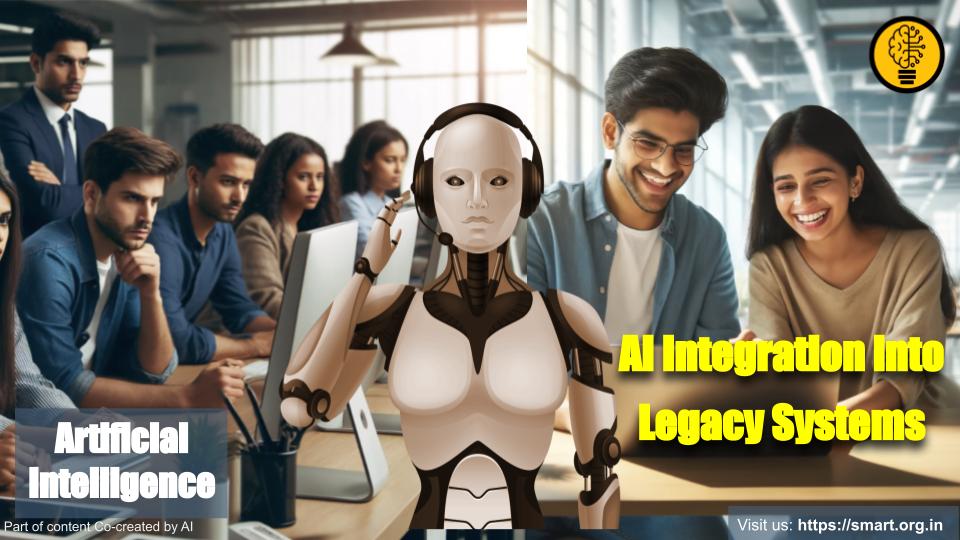In this ever-advancing digital era, Artificial Intelligence (AI) stands as a beacon of innovation and efficiency. Drawing from my own experiences navigating technological shifts, I’d like to explore the intricate journey of integrating AI into Legacy Systems—a task often as daunting as it is crucial. Let’s delve into the challenges and map out effective strategies for this integration, reflecting on both the hurdles and triumphs encountered in my career.
Deciphering the Challenges
Integrating AI into existing infrastructures (Legacy Systems) is a complex task, compounded by various obstacles. Reflecting on my days dealing with early computer technologies and data structures, here are some critical challenges:
- Technological Disparity: Much like the leap from basic programming to advanced software systems during my college days, integrating modern AI with aging technologies poses significant compatibility challenges.
- Isolated Data Repositories: Reminiscent of my early struggles with fragmented data in computer labs, legacy systems often feature data silos that impede the seamless flow needed for AI.
- Cultural Hesitancy: Changing established systems is akin to altering a well-loved recipe; resistance is natural but must be navigated with sensitivity and purpose.
- Expertise Deficit: The gap in necessary AI skills within organizations today mirrors the early days of computer science education, where expertise was scarce and highly sought after.
- Financial Constraints: Just as funding was a barrier to accessing cutting-edge tools during my academic years, the costs associated with updating legacy systems can be prohibitive yet necessary for progress.
Strategic Roadmap for AI Integration
Drawing from both my educational and professional experiences, I advocate for a methodical approach to integrating AI into legacy systems:
Gradual Implementation
- Incremental Updates: Embrace a phased approach, akin to how learning programming languages bit by bit helped solidify my understanding and skills.
- Pilot Initiatives: Launch small-scale projects to test AI capabilities within the system, ensuring manageable integration and clear demonstration of benefits.
Middleware Utilization
- API Deployment: Use APIs to bridge AI applications and legacy systems, a concept that reminds me of using middleware during my early software development projects to integrate disparate systems.
- Middleware Platforms: Implement solutions that can interpret and translate data across different formats, ensuring seamless communication between old and new technologies.
Data Management Overhaul
- Data Unification: Standardize data formats and consolidate storage solutions, reflecting the meticulous data structuring required in my early programming days.
- Robust Data Governance: Establish comprehensive governance practices to maintain data integrity and accessibility, crucial for effective AI deployment.
Cultivating AI Expertise
- Educational Programs: Invest in training to enhance staff competencies in AI, similar to how continuous learning was pivotal during my academic and professional growth.
- Specialist Recruitment: If gaps remain, hiring AI specialists can provide the necessary bridge between legacy operations and modern technology needs.
Promoting an AI-Adaptive Culture
- Change Management: Implement strategies to help personnel adapt to AI-enhanced processes, echoing the organizational changes I guided teams through during technology transitions.
- Engaging Stakeholders: Keep stakeholders involved from the outset to align goals and foster support for AI initiatives, mirroring the collaborative projects that marked my career.
Future Perspectives: The Rewards of Integration
The successful fusion of AI with legacy systems can significantly boost efficiency, improve decision-making, and enhance competitive edges, much like how adopting new programming techniques revolutionized operations in my past projects:
- Operational Efficiency: Automate routine tasks to allow focus on strategic initiatives, echoing the productivity boosts witnessed during automation of manual processes.
- Advanced Analytics: Gain deeper insights into operations and markets, similar to how data analysis transformed decision-making in my previous roles.
- Superior Customer Interactions: Enhance customer engagement through personalized AI-driven services, reminiscent of how technology improved user experiences in past projects.
While integrating AI into legacy systems presents distinct challenges, the strategic, step-by-step approach can lead to profound benefits. Reflecting on my journey from a fledgling computer science student to a tech innovator, I see the integration of AI not just as a necessity but as an opportunity to redefine and enrich our technological landscapes.
Smart Group India stands at the forefront of helping companies navigate the integration of AI into their legacy systems. With a deep understanding of both modern AI technologies and the intricacies of outdated infrastructures, they provide tailored solutions that bridge the gap between old and new. Their expert team offers comprehensive support, from strategic planning and system upgrades to staff training, ensuring a smooth transition to AI-enhanced operations.


In conclusion, we at Smart Group hope this article has provided you with valuable insights and actionable strategies. Smart Group India Incubation provides a nurturing environment for startups, offering comprehensive support and resources to foster growth and innovation. With access to expert mentorship, state-of-the-art infrastructure, and networking opportunities, startups can thrive in their journey from ideation to market launch. Explore our services in DevOps consultancy, IoT solutions, and cybersecurity to leverage cutting-edge technology for your business success. Join us to embark on a transformative journey towards entrepreneurial excellence. For further information and a deeper dive into this topic, we encourage you to explore the following resources. These links offer a wealth of knowledge and expert opinions that can enhance your understanding and assist you in applying these concepts effectively.
Startup Policies Govt. Of India
Startup News Sites
Publications
Research Papers